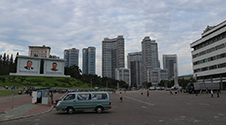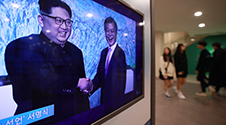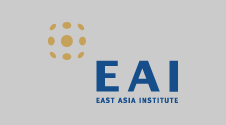Chairman Kim Jong-un replaced his New Year address with a report at the Fifth Plenary Meeting of the 7th Central Committee of the Worker’s Party in Korea (WPK) in early 2020. The report emphasized his determination to “break through head-on” dual obstacles related to the domestic economy and the international security environment. On the issue of denuclearization, Kim Jong-un insisted that he would not make any concessions, stating “no more talks [with the United States] until [its] complete and irreversible withdrawal of hostile policy (CIWH) toward North Korea.” Meanwhile, the United States continues to distrust the willingness of the Democratic People’s Republic of Korea (DPRK or North Korea) to denuclearize and has strengthened its commitment to the basic principles of the international order such as nuclear nonproliferation. As a result, there is little possibility that the U.S. would accept North Korea’s strategic attitude of maintaining minimum deterrence, which is what the regime innately desires to achieve.
After finishing the construction of a nuclear missile which holds the capacity to threaten the U.S. mainland, Chairman Kim has aimed to achieve guarantees of regime security, the lifting of sanctions and the reduction of U.S. forces on the Korean Peninsula. Once it accomplishes these goals, North Korea is likely to push for reform and opening by improving its foreign relations on the basis of step-by-step denuclearization efforts. For President Trump, it is important that he vaunts his diplomatic achievements and realize denuclearization through a “big deal” in light of the upcoming presidential election in November. With the strategies of Chairman Kim and President Trump acting as key variables in North Korea’s denuclearization, the year-end deadline that Pyongyang offered Washington for changing its North Korea policy has already passed and the challenge for reaching a consensus for North Korea’s nuclear issue still remains.
North Korea’s denuclearization is a multilateral issue that is not limited to U.S.-North Korea bilateral relations. The deadlock in U.S.-North Korean negotiations has also brought about a standstill in the improvement in inter-Korean relations by acting as an obstacle in the exchanges and cooperation efforts between the two Koreas. While President Moon Jae-in aims to implement a step-by-step process in North Korea’s denuclearization and in the establishment of a peace regime on the Korean Peninsula by avoiding wars and pushing for inter-Korean dialogue, he is also taking steps to mediate U.S.-North Korean negotiations. Furthermore, the North Korean nuclear issue is also a serious problem for China in regards to its policies extending beyond the Korean Peninsula including those toward the U.S. For Chinese president Xi Jinping, progress is denuclearization and the establishment of a peace regime is favorable provided that it leads to the reduction of U.S. troops in the region. President Xi adheres to U.N. sanctions, but has also supported North Korea behind the scenes, taking caution against the expanding influence of the U.S. within the region.
In a situation where it is unlikely for both the U.S. and North Korea to give preemptive concessions, it is practically inconceivable for the international community to ease economic sanctions placed upon the regime, which has declared to “break through head-on.” Economic sanctions imposed on North Korea have negatively impacted its economic growth for several years, leaving the country with large-scale trade deficits and weakened exports. North Korea has mustered self-reliance to boost its trade with China and build up its domestic infrastructure as well as tourism and service industries, but the country’s economic development—which requires high-level growth for a vast number of years—will soon reach a dead end without the lifting of economic sanctions. If economic sanctions persist despite internal efforts, the country could face a foreign exchange crisis due to a significant decline in its foreign currency holdings. Furthermore, continued decline in exports will damage North Korea’s markets. Given the past track records of the socialist countries such as Hungary and the Soviet Union, it is evident that North Korea will not wreak the benefits of reform and opening by policy alone if it retains its current administrative framework. In addition to nuclear deterrence and self-reliant efforts, the lifting of sanctions as well as reform and opening up based on its complete, verifiable, and irreversible denuclearization (CVID) are necessary conditions required for resolving the regime’s environmental challenges.
In addition to supporting North Korea’s domestic efforts to resolve its nuclear issue, the international community should make a concerted effort to adopt a more proactive engagement policy toward North Korea. In this context, it is worth discussing North Korea’s persistent efforts to exclude the Republic of Korea (ROK or South Korea) from the negotiating table while Seoul desires to assume the role of a mediator or a facilitator. For example, North Korea’s anti-South Korea media propaganda channel “Uriminzokkiri” emphasized in July 2019 that “with North Korea and the U.S. sitting down and discussing pending issues between the two countries, it is self-evident that the South doesn’t need to intervene.” In doing so, the channel called for an “exclusive communication channel” between the leaders of the U.S. and North Korea on January 11. Provided these circumstances, it is important that South Korea reaffirm its role in the negotiations and carefully construct its strategy in order to become a successful player in the North Korean denuclearization game.
To this end, South Korea and the U.S. need to cooperate extensively with North Korea. Currently, the Trump administration is likely to respond in a more passive manner to the North Korean issue due to the upcoming presidential election and instabilities in the Middle East regarding Iran. Meanwhile, the South Korean government still prioritizes the improvement of inter-Korean relations and such difference in perception between Seoul and Washington could lead to insufficient developments, or the lack thereof, in North Korea’s denuclearization. Therefore, it is necessary that South Korea and the U.S. realign their policy objectives toward North Korea and approach the problem in a multi-faced manner with cooperation from other actors on a broader diplomatic front. Provided the evident structural weakness of U.S.-North Korean negotiations, South Korea should place an effort to facilitate multilateral negotiations with other nations under the common goal of denuclearization. Multilateral efforts hold the potential to break the deadlock in negotiations and smooth the way for further U.S.-North Korean dialogue.
The Trump administration’s policy toward North Korea is likely to highlight immediate and short-term returns while South Korea’s North Korea policy must respond in a flexible manner to changes in North Korea’s stance and strategy. For example, South Korea’s North Korea policy has undergone various changes up until now from “entry to a nuclear freeze, exit from denuclearization,” to a “good enough deal” which was introduced in April-June 2018, to the newly proposed “preemptive countermeasure against the North” following October 2019. At this point, South Korea and the U.S. should cooperate on a more practical and concrete mid- to long-term strategy, which would include a working definition, the end goal, the final status, and corresponding measures for denuclearization.
A systematic action plan for denuclearization should not be biased. Instead, it should incorporate and implement strategies related to sanctions, deterrence, engagement, and internal transformation in a composite and balanced manner. First, economic sanctions should continue to be enforced to ensure future dialogues with North Korea. To this end, a mid- and long-term sanctions roadmap needs to be laid out and agreed upon by South Korea and other stakeholders. At the same time, South Korea should also work to build security contingency capabilities for responding to North Korea’s use of nuclear weapons and missiles, actively utilize deterrence through the regular deployment of U.S. strategic assets, and forge the Korean-style three-axis defense system of Kill Chain, Korea Air and Missile Defense (KAMD) as well as the Korea Massive Punishment & Retaliation (KMPR) system. In addition to sanctions and deterrence, engagement remains a key strategy, and it is necessary to come up with measures for establishing a practical peace regime. This would include providing and planning financial backing for North Korea’s denuclearization, economic development, and its new byungjin policy. It is also important not to undermine North Korea’s efforts toward self-driven internal transformation and development. Last but not least, South Korea should join forces with the international community and commit to developing a new “head-on breakthrough strategy”—one that is different from what the Kim regime has announced. The new strategy should allow for an environment in which the international community could support and pave the way for North Korea to voluntarily run on its own path towards denuclearization.■
"IMG_3855" by Shafquat Towheed is licensed under CC BY-SA 2.0


■ Jinkyung Baek received her MA in international relations from the University of Warwick in the United Kingdom. Currently, her work at EAI focuses on North Korea and security research as well as democracy in Asia. As such, she is the project manager in charge of the Asia Democracy Research Network, and the Global North Korea website, which compiles published works on North Korea from the United States, China, Japan, South Korea, and North Korea. Her research interests include North Korea, international relations, and international security. Her recent publications include “North Korea’s Biological and Chemical Weapons and the Path to Denuclearization” (Global NK Commentary, 2019) and “The Drive for North Korea Policy to Realize Peace and Prosperity on the Korean Peninsula” (Global NK Commentary, 2019).
■ Chaesung Chun received his PhD in international relations at Northwestern University in the United States, and serves on the policy advisory committee to the South Korean Ministry of Foreign Affairs and Ministry of Unification. His main research interests include international political theory, the ROK-US alliance, and Korean Peninsular affairs. He is the co-author of The Korean War: Threat and Peace, and the author of a number of publications including Are Politics Moral and International Politics in East Asia: History and Theory.





